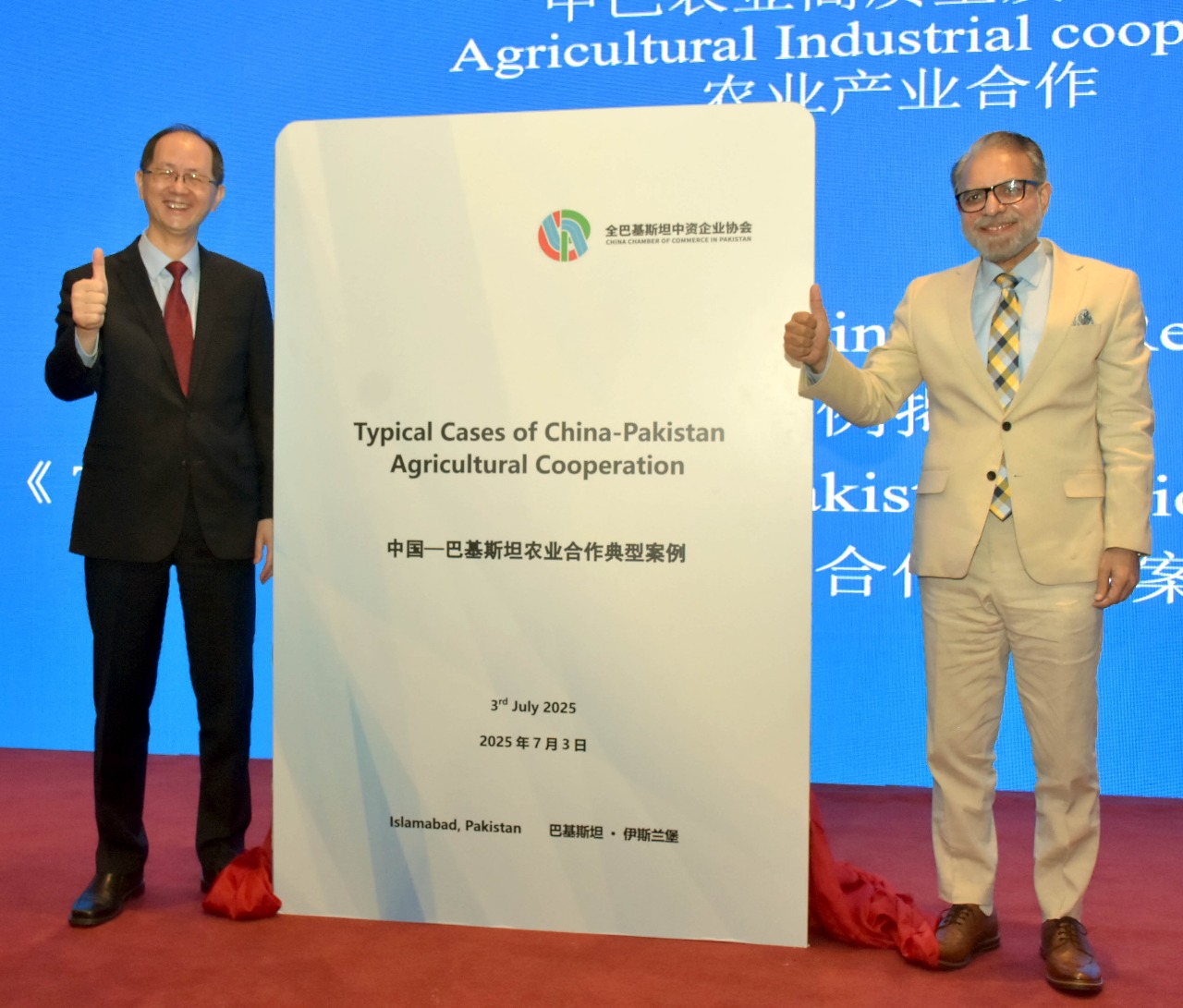By News Desk
A detailed report titled “Typical Cases of China-Pakistan Agricultural Cooperation” was officially launched on July 3 in Islamabad by the China Chamber of Commerce in Pakistan (CCCPK). The report outlines key agricultural projects jointly carried out by China and Pakistan, reflecting the strategic vision of both governments to deepen agricultural collaboration under the China-Pakistan Economic Corridor (CPEC).
The document emphasizes joint efforts in various sectors, including crop production, livestock development, disease control, mechanization, technology sharing, and capacity building. These initiatives aim to modernize Pakistan’s agriculture sector and promote resilience in the face of climate challenges.
Among the highlighted projects is the “Provision of Agricultural Equipment and Tools” initiative, under which China donated 278 units of modern farming machinery to Pakistan. Valued at RMB 30 million, the package includes tractors, seeders, harvesters, and solar-powered pumps—making it one of the largest agricultural assistance packages from China in recent years.
Another key initiative is the “China-Pakistan Buffalo Breeding and Dairy Processing” project, led by a Chinese technology firm under Royal Group. The project uses in vitro embryo transfer technology to improve milk yields and build a dairy value chain for export. It has already trained specialists, collaborated with hundreds of farmers, and generated about 1,000 jobs, transforming traditional grazing practices into structured breeding systems.
The “Chili Planting and Promotion Demonstration” project, led by Sichuan Litong Food Company, has introduced large-scale contract farming of chili in Pakistan. This initiative integrates farming, processing, and marketing, and is seen as a successful model for chili production under CPEC.
The report also details the “Hybrid Double Zero Canola Industrialization” project, a collaboration between Wuhan Qingfa Hesheng Seed Company and Pakistan’s EVYOL Group. This venture produced Pakistan’s first approved hybrid double-low canola variety, HC-021C, in 2019. Since then, over 100,000 hectares have been cultivated, yielding significant economic returns and edible oil production worth approximately USD 220 million.
In the field of cotton innovation, the “Cotton Innovation and Industrialization” project is working with leading institutions including CAAS, Tsinghua University, and MNS University of Agriculture. The initiative uses biotechnology and R&D to revive Pakistan’s cotton sector and enhance textile competitiveness.
The “Prime Minister’s Youth Training Program in China” is also featured in the report. The first cohort of 300 Pakistani agricultural graduates is receiving hands-on training in climate-resilient and smart agriculture at leading Chinese universities and technical colleges in Xi’an.
The report also includes the “China-Pakistan Joint Wheat Molecular Breeding Laboratory”, a collaboration among CAAS, Quaid-e-Azam University, NARC, and CIMMYT. This lab focuses on developing improved wheat varieties and increasing crop productivity.
In terms of industrial support, FAMSUN Group is helping to modernize Pakistan’s agricultural processing sector. The company offers advanced Chinese technology solutions in feed, storage, and oil processing, contributing to agricultural industrialization.
The sesame contract farming project, initiated in 2021 by CMEC, has now entered its commercial phase. With 12 demonstration farms across Punjab and Sindh, this initiative spans around 500 acres and has engaged over 120 local farmers under formal contracts.
The final project outlined is “Financial Empowerment to Elevate China-Pakistan Agricultural Cooperation”. The Industrial and Commercial Bank of China (ICBC), Karachi Branch, is offering a full suite of financial services, including cross-border RMB transactions and foreign exchange solutions, to support modern agricultural ventures aligned with CPEC priorities.
Collectively, these case studies demonstrate the breadth and impact of China-Pakistan agricultural cooperation. They showcase how bilateral collaboration is driving innovation, supporting rural development, and strengthening food security. The report underscores agriculture’s potential to become a cornerstone of economic growth and sustainable development in Pakistan through continued joint efforts.
